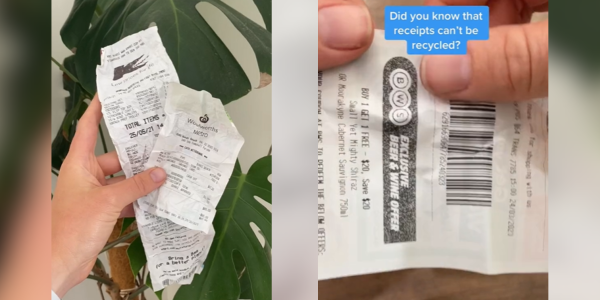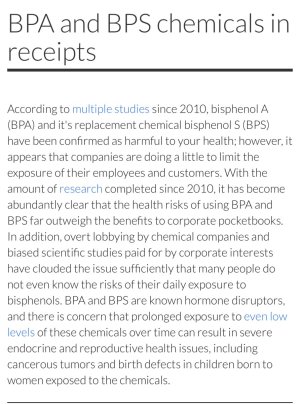Woolworths responds to circulating receipt allegations
Woolworths, one of Australia’s major supermarkets, has been accused of using receipts that are not recyclable.
But is there any truth to these claims? Let’s take a look.
The claims originated from a sustainability enthusiast on social media who posted a video showing a receipt from her local Woolworths Metro store.
In the video, Lottie Dalziel explained that supermarket dockets are made of thermal plastic, so they can’t be placed in green bins.
‘So they can’t go into your recycling bin, they need to go to your landfill instead,’ she said.
A person wrote in the comments section: ‘My mind is blown about this, I had no idea.’
These claims have been repeated by other users online, however, many supermarket shoppers questioned the truth in Lottie’s words.
‘Are you sure? I thought they were paper with a thermal ink?’ a commenter asked.
‘It’s just paper coated with chemicals that react to heat easily for printing. The coating can’t be removed for recycling, similar to wax-coated paper,’ another shopper explained.
However, it was reported that Woolworths has denied these claims–reassuring its customers that their receipts can be placed in green bins.
It is understood that the retail giant has been informed by its receipt paper supplier that the material is recyclable.
'Our eReceipts functionality available within the Everyday Rewards app was launched with the goal of streamlining the checkout experience for customers whilst also supporting our wider group sustainability commitments,' a spokesperson for Woolworths stated.
The spokesperson also noted that over one and a half million shoppers have opted out of paper receipts, saving on average 13 metres of paper per customer each year.
But why is this important?
As more and more consumers move online for their shopping needs, it’s important to remain conscious of our environmental footprint–and take responsibility for sustainably disposing of rubbish.
This follows the insolvency of REDCycle, a network that collects soft plastics–like shopping bags, bread bags, and wrappers–from retailers. Woolworths partnered with them as part of their sustainability initiative.
However, it was revealed that REDCycle had failed to pay storage fees for the tonnes of plastics stored in warehouses. Woolworths, along with Coles, offered to go through the estimated 12,000 tonnes of stockpile and see what they could recycle. Unfortunately, 5,200 tonnes of it had ended up in the landfill.
You can read more on this story here.

What do you think of this story, members? Let us know in the comments below!
But is there any truth to these claims? Let’s take a look.
The claims originated from a sustainability enthusiast on social media who posted a video showing a receipt from her local Woolworths Metro store.
In the video, Lottie Dalziel explained that supermarket dockets are made of thermal plastic, so they can’t be placed in green bins.
‘So they can’t go into your recycling bin, they need to go to your landfill instead,’ she said.
A person wrote in the comments section: ‘My mind is blown about this, I had no idea.’
These claims have been repeated by other users online, however, many supermarket shoppers questioned the truth in Lottie’s words.
‘Are you sure? I thought they were paper with a thermal ink?’ a commenter asked.
‘It’s just paper coated with chemicals that react to heat easily for printing. The coating can’t be removed for recycling, similar to wax-coated paper,’ another shopper explained.
However, it was reported that Woolworths has denied these claims–reassuring its customers that their receipts can be placed in green bins.
It is understood that the retail giant has been informed by its receipt paper supplier that the material is recyclable.
'Our eReceipts functionality available within the Everyday Rewards app was launched with the goal of streamlining the checkout experience for customers whilst also supporting our wider group sustainability commitments,' a spokesperson for Woolworths stated.
The spokesperson also noted that over one and a half million shoppers have opted out of paper receipts, saving on average 13 metres of paper per customer each year.
But why is this important?
As more and more consumers move online for their shopping needs, it’s important to remain conscious of our environmental footprint–and take responsibility for sustainably disposing of rubbish.
This follows the insolvency of REDCycle, a network that collects soft plastics–like shopping bags, bread bags, and wrappers–from retailers. Woolworths partnered with them as part of their sustainability initiative.
However, it was revealed that REDCycle had failed to pay storage fees for the tonnes of plastics stored in warehouses. Woolworths, along with Coles, offered to go through the estimated 12,000 tonnes of stockpile and see what they could recycle. Unfortunately, 5,200 tonnes of it had ended up in the landfill.
You can read more on this story here.
Key Takeaways
- A viral video claimed that Woolworths supermarket's receipts are made of thermal plastic and cannot be recycled.
- Woolworths, however, has refuted the claim, stating that its receipts can be placed in green bins as they are recyclable, according to their supplier.
- A Woolworths spokesperson added that members can opt for digital receipts instead. This initiative was introduced as part of their sustainability commitments.
What do you think of this story, members? Let us know in the comments below!









